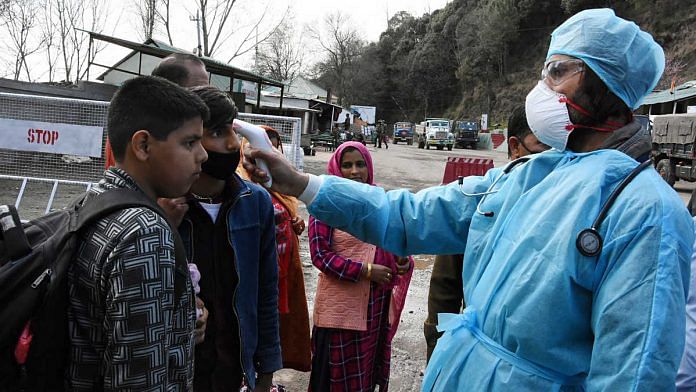New Delhi: Since these are early days of the coronavirus, the evidence that is coming out on medications is mostly anecdotal. In the US, Dr Anthony Fauci, director of the National Institute of Allergy and Infectious Diseases who is often seen standing beside President Donald Trump every evening during press conferences, also called the evidence on chloroquine anecdotal.
Many journals are publishing non-peer-reviewed papers. Facts aren’t completely established yet, and debates are still ongoing for many of them. One of the most important debates is whether we should give hypertension drugs or not.
According to early evidence that has come out, the usual suspects — diabetes, cardiovascular disease and hypertension — were found to increase the risks related to COVID-19. With age, these morbidities increase, and hence older people are more likely to die of the virus.
Also read: Of a cocktail of drugs and COVID-19, and why this virus is so smart
Hypertension is key risk factor
On 17 March, Italy’s public health officials reported that 76 per cent of the fatalities of COVID-19 suffered from hypertension and 33 per cent had cardiovascular diseases.
In the science journal The Lancet, Chinese scientists showed that a study on 191 fatalities of COVID-19 revealed that 91 of them had comorbidities. Additionally, 30 per cent had hypertension, 19 per cent had diabetes, and 8 per cent had coronary heart diseases. The study showed that the risk of organ failure increases with age.
The study also revealed that the average time a person is infectious to others is approximately 20 days, maximum 37 days.
Doctors have identified hypertension or high blood pressure as ‘a key dangerous factor’ that leads to distress and death in patients with the coronavirus.
The problem of blood pressure is especially prevalent in China, where 18 per cent of the population has been found to be hypertensive in a study in 2015. Additionally, 41.3 per cent of the population are borderline hypertensive.
Hypertension medicine may increase risk
A detailed letter by Chinese scientists in Lancet conjectured that the medicine for hypertension may actually increase the chances of contracting the virus or the risks of the virus. They argued that coronavirus latches on to ACE2 enzymes, and perhaps these medicines increase these proteins.
Dr Anthony Fauci said it’s important to look into this with more data. The American Heart Association has also asked patients to not change the medicine for hypertension. The debate on this is still on-going.
On 17 March, Dr Sandra Ciesek, director of the Institute of Medical Virology in Frankfurt, Germany, tested 24 passengers who had just flown in from Israel. Seven of the 24 passengers tested positive for coronavirus. Four of those had no symptoms.
She found that the viral load from asymptomatic patients was higher than the viral load from the three patients who did have symptoms.
This means patients who are asymptomatic are more likely to spread the virus.
You can watch the full episode of CTC here:
Also read: PM Modi, Trump address nations, say collective action needed to fight coronavirus



